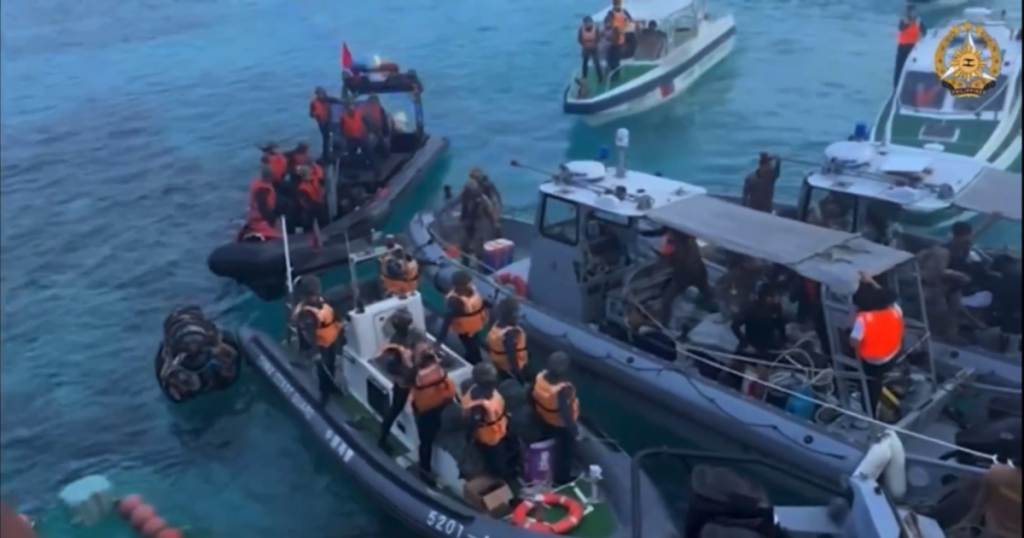US was not ready to commit troops to the West Philippine Sea
Still from a footage shared by the Armed Forces of the Philippines show Chinese Coast Guard vessels surrounding Philippine ships on its way to BRP Sierra Madre for a resupply mission. Watch the full video here.
By Manuel Mogato | Date 06-25-2024
MANILA — The United States would not commit additional forces to patrol the West Philippine Sea after the latest Chinese provocation in Ayugin Shoal, a Pentagon spokesman said, even as the US Navy’s 7th Fleet began its summer patrol in the region with a port visit to Manila.
Major-General Pat Ryder, the Pentagon’s press secretary, condemned China’s “reckless” and “unnecessary” behavior in disrupting the Philippine military resupply mission in BRP Sierra Madre.
However, Ryder said the US would not commit yet assets to help its long-time ally deter China’s coercive activities in the disputed waters. (Also read: US reaffirms ironclad commitment to the Philippines)
“We’re confident in our force posture in the region right now,” Ryder said when asked if the US would move assets to show support to the Philippines.
There were rumors in Washington that the US considered deploying some troops in the West Philippine Sea or sending escorts every time the Philippines delivered supplies to BRP Sierra Madre.
Ryder said the Philippines “should have the right to operate within their legal maritime claims.”
“Those need to be protected,” he said. “So again, we continue to stand by our ally, the Philippines, and we’re going to continue to call out this kind of irresponsible and reckless behavior when we see it.”
But beyond words of assurance, Ryder cannot commit troops and assets to patrol the volatile waters in the region.
US State Secretary Antony Blinken had a telephone conversation with Foreign Affairs Secretary Enrique Manalo after the June 17 incident.
“Secretary Blinken emphasized that China’s actions undermine regional peace and stability and underscored the United States’ ironclad commitments to the Philippines under our Mutual Defense Treaty,” a State Department readout said.
US State Department spokesman Matthew Miller said the two secretaries’ discussion focused on China’s ‘dangerous and irresponsible actions to deny the Philippines from executing a lawful maritime operation in the South China Sea.”
“The secretaries also exchanged views on how to build on the momentum from recent high-level bilateral engagements on issues of shared concern,” he added.
Without a clear assurance of support, the government of President Ferdinand Marcos Jr took a cautious approach to stoking more tensions in the area.
Executive Secretary Lucas Bersamin has dismissed as an armed attack the June 17 Chinese actions on two Philippine Navy’s rigid-hulled inflatable boats tied to BRP Sierra Madre.
“We’re not yet ready to classify this as an armed attack,” Bersamin said, adding, “Yung mga nakita namin is bolo, ax, nothing beyond that.”
(What we saw were bolo, ax, nothing beyond that.)
Bersamin convened the second National Maritime Council (NMC) to discuss the government’s plan of action and responses to the West Philippine Sea issue.
He said there was a decision to continue the military’s rotation and resupply mission to Ayungin shoal but would make an announcement to be more transparent about the activity. (Also read: Coast Guard plans ASEAN-wide drills)
Retired general Andres Centino, the presidential adviser on maritime concerns, said there were no discussions on invoking the Mutual Defense Treaty with the United States.
“The invocation of the Mutual Defense Treaty was not considered in our discussions,” he added.
Bersamin said the Philippines is ready to work with China to ease tensions in the West Philippine Sea.
“If China wants to work with us, we can,” he said. “We’ll work with China.”

